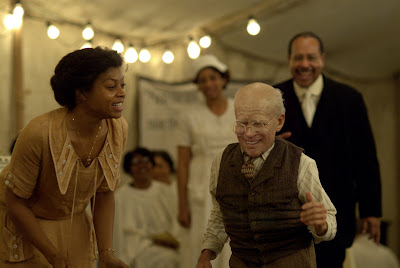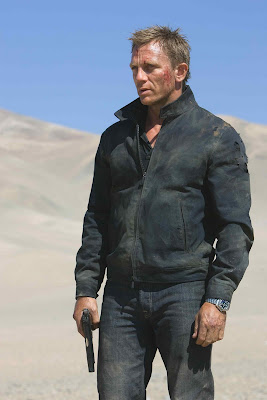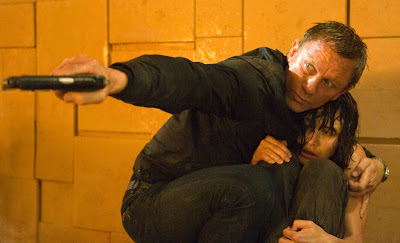REVIEW: The Curious Case Of Benjamin Button

The winter season in Hollywood means awards movies. Every year around this time, we see movies start to come out that will eventually collect a myriad of accolades on the way to competing for the big prize, the Academy Award for Best Picture. But up to this point, I hadn't seen any films that I thought could be serious favorites to win that category. Sure there were fan favorites like The Dark Knight or Wall-E, or indie sleepers like Slumdog Millionaire, but none of them seemed like movies that we'd traditionally consider Oscar bait. Well, Oscar voters just got thrown a serious piece of bait.
David Fincher, keeping himself uncharacteristically busy, makes his second movie in as many years, following up last year's Zodiac with an adaptation of F. Scott Fitzgerald's short-story of the same name (though the film's story is a considerable departure from the original). Brad Pitt stars as the titular Button, a man who is born old and ages backwards. Cate Blanchett co-stars as the appropriately-named Daisy, his childhood sweetheart. Taraji P. Henson, Tilda Swinton, Julia Ormond, and Jared Harris turn in notable supporting performances as well. Where to begin? This is a movie that is both groundbreaking and traditional. The make-up and effects used to cast Pitt as an elderly child and a disarmingly youthful old man are stunning, to say the least. Fincher, as usual, gives us a visually arresting movie that is unafraid to use creative means to deliver the story. But the film is also traditional in the vein of Hollywood epics of old. It takes a very classical approach to telling its sweeping narrative that spans the entire life of a man. It travels through various localities and several time periods, but like the best of old Hollywood, it is a love story at its heart. And whether he did so intentionally or not, Fincher suffuses the film with a haunting sense of romance, crafting a genuinely moving tale that remains nonetheless just slightly emotionally distant and hard to touch. Fincher does do a tremendous job navigating the time that flies by, pacing the eighty-odd years covered in the film with surprising fluidity. It being a massive story, though, the film still runs 2 hours and 47 minutes. But it's a quick 2 hour and 47 minutes, and earlier concerns over a laggy third act seem to have been cleared up, as you never really notice the running time because what's happening on screen is so captivating.
Where to begin? This is a movie that is both groundbreaking and traditional. The make-up and effects used to cast Pitt as an elderly child and a disarmingly youthful old man are stunning, to say the least. Fincher, as usual, gives us a visually arresting movie that is unafraid to use creative means to deliver the story. But the film is also traditional in the vein of Hollywood epics of old. It takes a very classical approach to telling its sweeping narrative that spans the entire life of a man. It travels through various localities and several time periods, but like the best of old Hollywood, it is a love story at its heart. And whether he did so intentionally or not, Fincher suffuses the film with a haunting sense of romance, crafting a genuinely moving tale that remains nonetheless just slightly emotionally distant and hard to touch. Fincher does do a tremendous job navigating the time that flies by, pacing the eighty-odd years covered in the film with surprising fluidity. It being a massive story, though, the film still runs 2 hours and 47 minutes. But it's a quick 2 hour and 47 minutes, and earlier concerns over a laggy third act seem to have been cleared up, as you never really notice the running time because what's happening on screen is so captivating. Eric Roth's screenplay is his most ambitious in some time, and it mirrors the scope of another one of his movies, Forrest Gump. Like that film, Benjamin Button gives us a peculiar character that is something of an outcast who, like Forrest, finds the love of his life at an early age and then spends a good deal of his formative years pursuing her. Despite the odds, he also goes on to lead a colorful and meaningful life. The story can be dark at times, but Roth peppers it with strokes of humor and romance that humanize it. We invest in his characters on a basic level, and this allows us to join them on their fantastic journey. In fact, this film is very much about the journey we’re all on. Time and age are considered in interesting ways throughout the movie, adding up to a meditation on how no matter if we’re going forward or backward, we’re still headed to the same place. There's also an interesting frame story involving Hurricane Katrina that adds an element of foreboding to the film, but the innocuous way it plays out is moving and organic without feeling overdone or heavy-handed.
Eric Roth's screenplay is his most ambitious in some time, and it mirrors the scope of another one of his movies, Forrest Gump. Like that film, Benjamin Button gives us a peculiar character that is something of an outcast who, like Forrest, finds the love of his life at an early age and then spends a good deal of his formative years pursuing her. Despite the odds, he also goes on to lead a colorful and meaningful life. The story can be dark at times, but Roth peppers it with strokes of humor and romance that humanize it. We invest in his characters on a basic level, and this allows us to join them on their fantastic journey. In fact, this film is very much about the journey we’re all on. Time and age are considered in interesting ways throughout the movie, adding up to a meditation on how no matter if we’re going forward or backward, we’re still headed to the same place. There's also an interesting frame story involving Hurricane Katrina that adds an element of foreboding to the film, but the innocuous way it plays out is moving and organic without feeling overdone or heavy-handed. Brad Pitt turns in one of his most memorable performances yet, bringing a casual amiability and subtle tones of heartache to a truly intriguing character. He breathes a tangible vivacity into Benjamin Button at every point of his life, but does his best work in the early years, when Button has the most to learn and the fearlessness to pursue that knowledge. It's hard for someone as recognizable as Brad Pitt to disappear into a role, but he does it in spectacular fashion in this movie. Cate Blanchett is equally stellar, giving us a complicated look at the girl who gets entangled in the life of the mystifying Benjamin Button. In an interesting twist, Daisy grows to be more obsessed about age than Button, who is comfortable in his skin after having dealt with age as a constant and palpable presence in his life for so long. Blanchett imbues Daisy with mixes of grace, moxie, and vulnerability, a fully-realized character from beginning to end.
Brad Pitt turns in one of his most memorable performances yet, bringing a casual amiability and subtle tones of heartache to a truly intriguing character. He breathes a tangible vivacity into Benjamin Button at every point of his life, but does his best work in the early years, when Button has the most to learn and the fearlessness to pursue that knowledge. It's hard for someone as recognizable as Brad Pitt to disappear into a role, but he does it in spectacular fashion in this movie. Cate Blanchett is equally stellar, giving us a complicated look at the girl who gets entangled in the life of the mystifying Benjamin Button. In an interesting twist, Daisy grows to be more obsessed about age than Button, who is comfortable in his skin after having dealt with age as a constant and palpable presence in his life for so long. Blanchett imbues Daisy with mixes of grace, moxie, and vulnerability, a fully-realized character from beginning to end. There should be at least a brief mention here of the amazing work other contributors to the film have put in. Usually Fincher's gaffer, Claudio Miranda has stepped in as the Director of Photography and given audiences a gorgeously-shot film, particularly ripe with shadows and hard edges. Alexander Desplat is again wonderful, turning in a hauntingly beautiful score. The production design and art direction give us a lush vision of America throughout the 1900s, adding a vivid sense of life to the environments we pass through.
There should be at least a brief mention here of the amazing work other contributors to the film have put in. Usually Fincher's gaffer, Claudio Miranda has stepped in as the Director of Photography and given audiences a gorgeously-shot film, particularly ripe with shadows and hard edges. Alexander Desplat is again wonderful, turning in a hauntingly beautiful score. The production design and art direction give us a lush vision of America throughout the 1900s, adding a vivid sense of life to the environments we pass through.
The Curious Case of Benjamin Button is one of those rare films that combines all the right storytelling elements with a great cast, culminating in an intensely satisfying cinematic experience. I expect it to receive at least a nomination in every major category this February, and they'd all be justly earned. I hesitate to come off sounding hyperbolic, but this is one of those films that doesn't just make best-of-the-year lists; it could very well enter the discussion of best-of-all-time lists. When it opens this Christmas, make sure you get out to see it. It's not a journey you'll want to miss being a part of.











